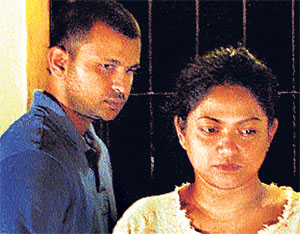I know we’re only halfway through 2008, but I’m prepared to bet that Jake Oorloff’s A Bedtime Story is probably the most stunningly original drama you will see on stage this year.
Of course, it’s not unusual for a play to be hyped in the press as stunning, but it is rare for a production to take such a description of itself quite so literally and leave its audience physically stunned. Sitting in silence as the lights came down and the sound of a lone acoustic guitar faded away, we sat uncomfortably, unable to applaud. Slowly the play released its grip on the audience’s collective consciousness, freeing it to show its appreciation. Yet when we did applaud it was done briskly, without encore or unnecessarily indulging the director or the cast, as if the audience were in a hurry to leave, to find the exit and to seek reassurance in the familiar chaos of the evening commuter traffic on Kotte Road, where normal lives could be resumed.
 |
| Mario de Soyza and Ruhanie Perera in a scene from the play |
Our normal lives? On a normal day in Sri Lankan there are, according to informed sources, more than 40,000 children working as prostitutes. The majority are boys who engage in homosexual and heterosexual sex with foreign tourists. Sri Lanka is, like Thailand and Cambodia, a well established sex-tourism destination.
A Bedtime Story chronicles the life of Kasun, a child prostitute, as seen through the eyes of four individuals: his father, his mother, his teacher and his classmate.The narrators in turn take time to establish their own personal context before exploring their relationship with Kasun. A poor uneducated father, with no permanent job, labouring hard to earn what little he can for his caring wife and their quickly growing family. A loving mother, striving to feed and look after her three children and support her hard working husband, as they are forced from one town to the next in search of work.
Then the father receives an unexpected offer from an acquaintance to earn a little extra money for the family. All Kasun has to do was to play with some foreigners who like children but have none of their own. Kasun returns from his first day at work with the money that was promised, but also with explanations and descriptions that a father cannot bear to hear. Yet the die is so quickly cast. Kasun’s money provides respite for the family’s daily financial struggles and he returns to play with his foreign friends, again, and again, and again.
At school his teacher observes a bright student who passed his grade five scholarship exam become disinterested, disruptive and finally dismissive of classroom studies. From the perspective of the playground, his best friend narrates Kasun’s loss of childhood and innocence. Kasun spends more and more time away from school, returning only to flaunt his unaccountable wealth. When he does confide in his best friend, about what he does when he goes to 'play with his foreign friends', his tone shifts from initial bewilderment, becoming increasingly arrogant and ultimately dismissive of any criticism by elaborately detailing the future life he will soon have, living and working abroad with one of his ‘friends’.
We are not told if Kasun’s dream of going abroad is ever realized.
This is too subtle a piece of writing for definitives: it's not about what happens, but why child prostitution happens. Not once, remember, but several thousand times a day, every day, today, in Sri Lanka. Kasun’s father, mother and best friend each close out their performances with quiet soliloquies, laying bare their own compliance and moral acquiescence in Kasun’s bedtime story. Only his teacher is harsh in her final judgment of Kasun and his parents. Yet even her moral indignation may well have been directed inwards, at the impotence and indifference in Sri Lankan society, which as a teacher she represents. The audience was quelled on the one hand by simple, direct speech and unambiguous emotions. On the other hand we were strung out by taut direction and subtle acting that left us equally incapable of reaching a moral judgment on child prostitution in Sri Lanka. Which, when you think about it, is an extremely disturbing Bedtime Story.
A Bedtime Story was written and directed by Jake Oorloff. Mario de Soyza played Kasun’s father, Ruhanie Perera played Kasun’s mother, Ashini Fernando his teacher and Ruvin De Silva was his best friend. A Bedtime Story was produced by Fun-Duh-Mental in association with the Interact Club of Royal College and performed at the Namel Malini Punchi Theatre, Borella.
|

